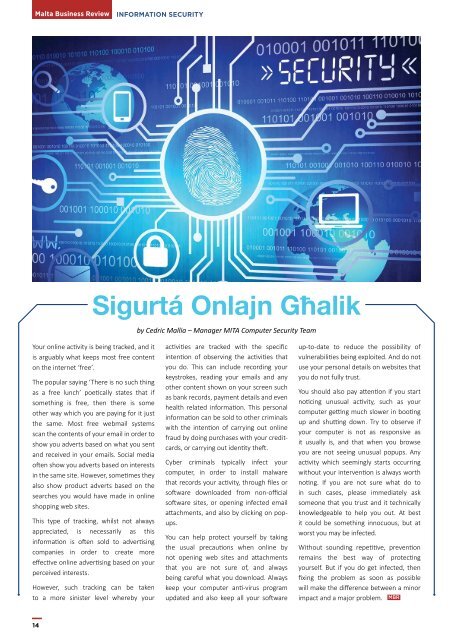MBR_Issue_28 -February 2017 (1)
Create successful ePaper yourself
Turn your PDF publications into a flip-book with our unique Google optimized e-Paper software.
Malta Business Review<br />
INFORMATION SECURITY<br />
Sigurtá Onlajn Għalik<br />
by Cedric Mallia – Manager MITA Computer Security Team<br />
Your online activity is being tracked, and it<br />
is arguably what keeps most free content<br />
on the internet ‘free’.<br />
The popular saying ‘There is no such thing<br />
as a free lunch’ poetically states that if<br />
something is free, then there is some<br />
other way which you are paying for it just<br />
the same. Most free webmail systems<br />
scan the contents of your email in order to<br />
show you adverts based on what you sent<br />
and received in your emails. Social media<br />
often show you adverts based on interests<br />
in the same site. However, sometimes they<br />
also show product adverts based on the<br />
searches you would have made in online<br />
shopping web sites.<br />
This type of tracking, whilst not always<br />
appreciated, is necessarily as this<br />
information is often sold to advertising<br />
companies in order to create more<br />
effective online advertising based on your<br />
perceived interests.<br />
However, such tracking can be taken<br />
to a more sinister level whereby your<br />
activities are tracked with the specific<br />
intention of observing the activities that<br />
you do. This can include recording your<br />
keystrokes, reading your emails and any<br />
other content shown on your screen such<br />
as bank records, payment details and even<br />
health related information. This personal<br />
information can be sold to other criminals<br />
with the intention of carrying out online<br />
fraud by doing purchases with your creditcards,<br />
or carrying out identity theft.<br />
Cyber criminals typically infect your<br />
computer, in order to install malware<br />
that records your activity, through files or<br />
software downloaded from non-official<br />
software sites, or opening infected email<br />
attachments, and also by clicking on popups.<br />
You can help protect yourself by taking<br />
the usual precautions when online by<br />
not opening web sites and attachments<br />
that you are not sure of, and always<br />
being careful what you download. Always<br />
keep your computer anti-virus program<br />
updated and also keep all your software<br />
up-to-date to reduce the possibility of<br />
vulnerabilities being exploited. And do not<br />
use your personal details on websites that<br />
you do not fully trust.<br />
You should also pay attention if you start<br />
noticing unusual activity, such as your<br />
computer getting much slower in booting<br />
up and shutting down. Try to observe if<br />
your computer is not as responsive as<br />
it usually is, and that when you browse<br />
you are not seeing unusual popups. Any<br />
activity which seemingly starts occurring<br />
without your intervention is always worth<br />
noting. If you are not sure what do to<br />
in such cases, please immediately ask<br />
someone that you trust and it technically<br />
knowledgeable to help you out. At best<br />
it could be something innocuous, but at<br />
worst you may be infected.<br />
Without sounding repetitive, prevention<br />
remains the best way of protecting<br />
yourself. But if you do get infected, then<br />
fixing the problem as soon as possible<br />
will make the difference between a minor<br />
impact and a major problem. <strong>MBR</strong><br />
14

















